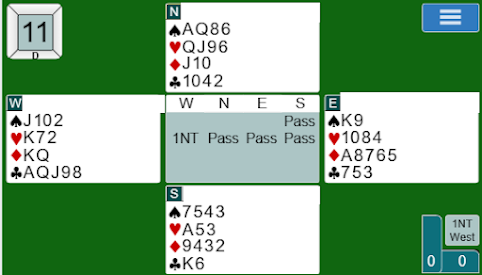Question: Both E and W have hands with 13 HCP, they wind up in 3 C but
probably should have been in 3 NT. Should E have bid 3 NT even though D were
not bid?
Mark:
First, let's talk about the ideal contract with these 2
hands, assuming we don't get to peek at N-S, which lets us see that 6 clubs is
made easily. 3NT is likely to make, probably with overtricks, which means that
at duplicate it likely will score better than 5 clubs, whether 5 clubs makes 5
or 6. Since it is unlikely that 6 clubs will be bid at more than 1 or 2 tables,
and more often none, the relatively safer contract of 3NT is the practical
ideal. Note that against some possible N-S distributions,(Not the actual one) a
spade lead could render 3NT unmakeable while 5 clubs would be pretty safe.
That's worth considering if you are playing an IMP team game.
Now let's address the bidding on the West hand: Your
partner has opened the bidding and you have 13 high- card points. You should be
aware of the following:
1. It is probable (Somewhere between 60% and 100%) that
your side can make game.
2.
You know this and your partner doesn't. As far as your partner knows, you can't
make more than 7 or 8 tricks, even though you had enough to respond in the
first round and both opponents look ready to fall asleep.
3.
All, or nearly all, pairs in your direction will bid game. You could get an OK
result even if the hand is unlucky and the game can't be made.
4.
It is totally your responsibility to see to it that you bid game or keep making
FORCING bids until game is reached.
If instead of 13 points you have 11 or 12 points, you
should make bids that are invitational but don't bid or force to game unless
partner invites with a bid that shows extras. You must also be tuned in to
whether partner is making a minimum, invitational or FORCING bid.
Back to the hand at hand. I'm still talking to W. You
responded correctly 1 S over partner's opening bid. Some players prefer to
promise 5 cards with a 1S bid, but what you did is fine, as long as both
partners agree. Your partner's 2 club bid now is unlimited, could be made on 21
points, so it is 100% FORCING! There is nothing weaker you can say than 3
clubs, no matter how cheerfully you place that bid on the table. 3 C could show
as little as 5 or 6 points and 3 clubs. This is very likely to become the final
contract. It's understandable that all your alternatives other than 3 clubs
seem to be problematic. Failing to raise clubs, by bidding diamonds or NT seems
to deny your enthusiasm for partner's 2nd suit. Showing that enthusiasm by
jumping to 4 clubs has 2 problems, in that it bypasses 3NT, which could well be
the best contract and, positive as it is, isn't 100% FORCING. In a partnership
without a little advanced methodology, I'm afraid the best alternative for W is
to just jump to 3NT (over 2 clubs) and risk the possibility of missing a
superior club contract. At least you don't miss game. In partnerships with more
advancement, W can bid 2 D over 2C, which is "4th suit FORCING." You
neither promise nor deny strong diamonds, but you force partner to bid at least
once more, while showing invitational or game values. Some experts play
"4th suit" as always forcing to game; others treat it as highly
invitational.
Now look at East's point of view after W bid 3 clubs
as shown. The weakest hand within the range of W's 3 club bid is if you
replaced the AK of diamonds with Jx. I'm giving you a gift of that J. It could
be 4 small ones. If E is very optimistic and aggressive, they could consider an
invitational action, realizing that they could be wading into minus territory.
I still don't think E should consider 3NT. 3D if you play "4th suit"
as merely invitational is an option. Remember that people who play "4th
suit artificial and forcing" aren't necessarily showing length or strength
in the suit bid. They are just saying to partner "Tell me more." I
don't think most readers of this series are ready for it, but if you have a
regular partner and you are both ready for it, read up on "4th suit
forcing" and start to incorporate it. It's a real handicap if your
partnership isn't ready for that tool, but don't start using the tool before
it's time.






